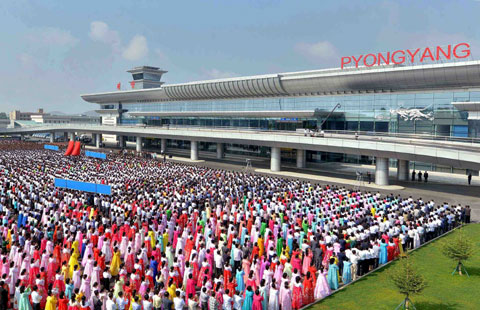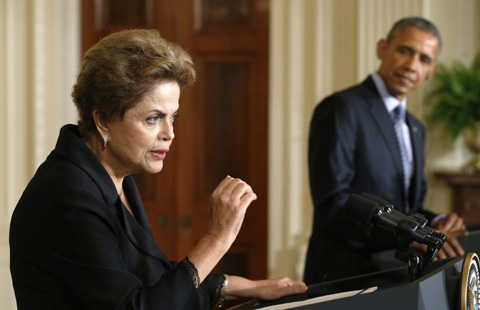Move to Houston pays off with new business
Updated: 2015-07-03 11:28
By MAY ZHOU in Houston(China Daily USA)
|
||||||||
Move to Houston pays off with new business
Management emphasizes cross-culture awareness and localization
It has been about two years since PetroChina International (America) moved its headquarters to Houston from New Jersey in 2013 - a strategic move that obviously has paid off, according to President Li Shaolin.
"We have nearly doubled our personnel to about 130, opened a new branch office in Rio de Janeiro, Brazil, and developed new products for our trade business," he said.
To Li, Houston has lived up to its reputation as the Oil Capital of the World. "In Houston we can readily find whatever talents we need; our potential partners are mostly in Houston; and the social environment here is very conducive to business - we get help all around in the community, and I find southern people warm, practical and efficient when it comes to business partnership," said Li.
In the past year, Li said PetroChinaAmerica has been focusing on three areas - market expansion, vertical integration and information system updating.
"With the opening of Rio branch office, we have developed six new markets. Now PetroChina has coverage of the entire market of North, Central and South America with offices in Houston, Rio and Calgary. Our next goal is to better sustain our business on a long term basis and negotiate business deals in packages," said Li.
PetroChinaAmerica has six employees in Brazil with a focus on downstream crude oil and natural gas products. The goal is to expand the number of personnel to about 15 like its Calgary, Canada,counterpart.
"The Rio office was opened in July, 2014, and we already made profit by the end of last year. Brazil is an emerging country with lots of opportunities, like a smaller version of China. Of course, our Rio office functions as an anchor and it fans out to cover other surrounding South American markets as well," Li said.
PetroChina America also managed to export 400,000 tons of solid ammonia from China to United States and other countries in the Americas last year, a new product for the company that also brought in new trade partners.
Internally, PetroChinaAmerica shifted its focus from specific trading projects to vertical integration with an emphasis on research, technical analysis,strategic analysis, and business development.
"In the past, when we hire people, we wanted someone who can immediately do trading on the floor. Now, we hire more traders to conduct research for decision-making, marketing expansion in terms of new products and new customers, and developing new business models. About 30 percent of ourtrade team is assigned to research," said Li.
That move brought a small profit windfalltoPetroChina America.
"Last year, three research teams of ours all correctly predicted that the crude oil price would soon experience downturn. Based on this projection, we made necessary moves and preparations. As a result, we made a nice bundle of extra profit in millions," said Li.
Another move by PetroChina America was updating its infrastructures with the most advanced information system. The system updating encompassed almost all of PetroChina America's business, including trading, shipping, chartering, operating and internal accounting.
"We invested $1.5 million to implement E-TRADE for natural gas alone - a move to improve our commodity trade efficiency. This industry is fast paced - five deals could happen in a mere minute. Now we can transact a trade and print out invoice in a matter of minutes," said Li, adding that a similar upgrading is underway for crude oil and refined oil trade.
Besides the cost-effective benefits, the system updating also enables PetroChinaAmerica to customize products and service to clients' specific needs.This helps the company to get new customers and produce new products, according to Li.
When it comes to successful management of the company, Li said localization and cross-culture awareness are the keys.
Currently, 85 percent of PetroChina America's employees are hired locally with the remained being expats sent from its Beijing headquarters. Li said his goal is to increase the ratio of local hire to 90 percent. At the management level, the heads of its four business departments are local hires. "We assigned only one Chinese to each department. They function as the liaison between the departments and the upper level management in Beijing,'' he said.
With such a high percentage of local hires operating under aprimarily Chinese management team, it is tricky to make the majority of employeesfeel comfortable and to retain talent. To Li, this is the biggest challenge in running the company.
"Company culture is something you can't see and touch, yet it's everywhere. I want people to want to work for us– this requires us to provide a welcoming cultural environment. My motto is, the soft culture needs to be softer, and the performance evaluation based on data needs to be more concrete."
Tothat end, Li said he pays special attention to the languagedifference. For example, English is designated as the official office language and no Chinese is allowed in office communications. Company policy also stipulates that as long as there is one local employee present, all employees are required to speak only English.
Language aside, PetroChina America also brings employees of different cultural backgrounds together through monthly events, such as remote-controlled boat races in the lake in front of the office building, making dumplings, a Fourth of July celebration, Thanksgiving gathering and birthday parties. "We try to get people to know each other's culture better and feel more comfortable with each other," Li said.
Such special attention to company culture seems to have worked. According to Li, PetroChina America's employee retention rate was more than 97 percent in the past year.
As PetroChina America has been expanding, its profit has also been increasing consistently since it first started. Revenue has been growing at a steady rate of 27 percent and doubling every three to four years. In 2014, revenue was $12.5 billion.
PetroChina America is a US subsidiary of PetroChina Co Ltd, which wasestablished in 1999 as a joint stock company of State-owned China National Petroleum Corporation (CNPC). With headquarters in Beijing, PetroChina is the country's biggest oil and gas producer and one of the world's largest crude-oil producers and traders.
In 2014, PetroChina's total crude oil output reached 945.5 million barrels, representing an increase of 1.4 percent over 2013. Marketable natural gas outputreached 3,028.8 billion cubic feet, representing an increaseof 8.1 percentover the previous year. Overall, its oil and naturalgas equivalent output increased 3.6 percent over 2013.
Zheng Yi contributed to this story.
mayzhou@chinadailyusa.com
- Injured ROK tourists in intensive care
- 36 dead, 26 missing after banca capsized in C. Philippines
- Thai navy plans to buy three Chinese subs
- Mass casualties in Indonesian military plane crash
- Japan's LDP lawmaker denounces Abe's security policies
- More than 100 feared dead in Indonesian military plane crash

 Western Europe swelters in long-lasting heat wave
Western Europe swelters in long-lasting heat wave
 Top 10 shareholders of AIIB
Top 10 shareholders of AIIB
 Massive Hello Kitty theme park opens to visitors
Massive Hello Kitty theme park opens to visitors
 New terminal of Pyongyang Intl Airport put into use
New terminal of Pyongyang Intl Airport put into use
 Ten paintings to remember Xu Beihong
Ten paintings to remember Xu Beihong
 Obama hails new chapter in US-Brazil relations
Obama hails new chapter in US-Brazil relations
 Boxers top Forbes highest paid celebrities list
Boxers top Forbes highest paid celebrities list
 Not so glamorous: Glastonbury ends with sea of rubbish
Not so glamorous: Glastonbury ends with sea of rubbish
Most Viewed
Editor's Picks

|

|

|

|

|

|
Today's Top News
Solar-powered plane breaks solo flight record across Pacific to Hawaii
California mulls move to 'zero-emission buses'
Veteran diplomat in Havana shortlisted for ambassador
Move to Houston pays off with new business
IPR law acted out
Economic growth driving force for China's future mobility: Think tank
'Operation duck' and the student savior from internment camp
White House lifts ban on cameras during public tours
US Weekly

|

|






